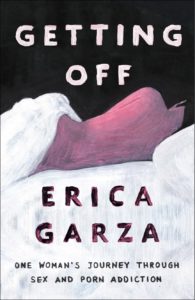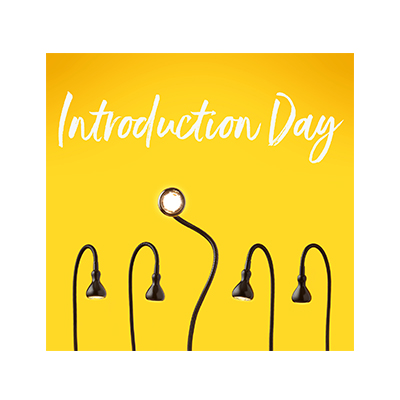 Erica Garza struggled with the loneliness and shame of sex and porn addiction for two decades, during which she tried many self-help routes, including Hoffman. The Process helped her to connect with a key childhood event which proved particularly enlightening.
Erica Garza struggled with the loneliness and shame of sex and porn addiction for two decades, during which she tried many self-help routes, including Hoffman. The Process helped her to connect with a key childhood event which proved particularly enlightening.
Now happily married, Erica is determined to help others to understand the link between addiction and ‘ordinary trauma’ with the launch of her new book Getting Off.
Some people might consider sex and porn addictions to be comparatively ‘glamorous’ compulsions, as opposed to drug addiction, for example. What’s the price of a sex addiction, and do you have any insight into what sent you down your particular path?
I think the reason I chose sex and porn (beginning with chronic masturbation) was accessibility. I stumbled across softcore porn and started to explore my body when I was 12, and these were things I could reach for in secret behind closed doors whenever I wanted them. Then with the growth of the internet, accessibility was even better. In retrospect, I don’t think there was anything particularly abnormal about my sexual curiosity, however soon after I was diagnosed with scoliosis, which led me to feel incredibly self-conscious and fearful of social rejection. I found that masturbation and porn were effective methods of escaping these big, scary feelings and I quickly grew to depend on them in order to cope. I often used sex or porn as escape methods from emotional distress. Oftentimes this pursuit was fuelled by adrenaline and, post-orgasm, led to feelings of shame, a feeling of disconnectedness, and even emptiness.
Sex addiction is rarely sexy. When I think back, sure there were moments of exhilaration, but mostly there was desperation, lying, loneliness, and shame. The most significant price I paid for being a sex addict was feeling so alone and cut off from other people. I knew how to float through relationships, how to keep things light and easy, but when it came to love and to caring or being cared for—I considered those things too risky, which led me to feel like I was only living halfway.
 Is abstinence a valid approach to the treatment of sex or porn addiction, in your experience?
Is abstinence a valid approach to the treatment of sex or porn addiction, in your experience?
Every addict must do the work to identify his or her own unique methods of acting out. My addictive behaviours consisted of obsessing about sex, bingeing on porn, having frequent unprotected casual sex encounters, lying, and sabotaging meaningful relationships. In the early stages of my recovery, I took a break from watching porn and settled into a committed, monogamous relationship and these were important steps for me because they gave me the time and space I needed to face all the emotional distress I’d been running from and to start integrating new, healthier habits in my life. But, over time, I started to feel like I was cutting off important aspects of my sexuality. I still wanted to be an open-minded, experimental sexual person, but I didn’t want sex to be the main driving force of my life. I didn’t want to lie or destroy my relationships or feel ashamed. These were important truths to consider and I realized that my focus had to be less on abstaining completely and more on achieving balance.
Have you found that acknowledging and working on recovery from your addictions has made sex less enjoyable for you?
On the contrary, sex is more fulfilling, intimate, and even empowering now. I no longer feel empty or ashamed after I have sex. I’ve been able to develop a new type of relationship with my sexuality—one that is guilt-free, open-minded, and connected.
You mention in your book Getting Off that you tried other self-help courses before you did Hoffman, yet it plainly made a big impression. What made the Process stand out for you?
The Process gave me the time and space to reflect on how I’d learned my patterns—sexual and otherwise—extend compassion to myself, and make real changes. The Process was also extremely practical—I learned tools that I could take with me to continue learning about myself while cultivating healthier ways of living and thinking. If it weren’t for the Process, I probably would never have realised the significance of my sexual addiction coinciding with the trauma of being diagnosed with scoliosis and consequentially bullied—all happening at 12 years old. On the Process I was able to look back and reclaim the girl who wanted so badly to be loved and to care for her in ways she—and I—still desperately needed.
You say that ‘trauma can be ordinary’. So does that mean even someone who’s had a relatively ‘normal’ childhood could benefit from something like the Process?
Absolutely. Many people think that sex addiction, especially when it comes to a woman, must be preceded by a traumatic event like rape or molestation. But sex addiction can happen to anyone. I consider my trauma “ordinary” in comparison to the kind of suffering many other people face. I was fortunate enough to grow up in a safe, loving home. I never went to bed hungry or faced abuse. Yet, I developed unhealthy patterns of dealing with not just scoliosis and bullying, but feeling left out when my parents had another child, feeling socially anxious in my teenage years, feeling insecure about my bodily changes, etc. These are the types of everyday problems or “traumas” that many young people face and sometimes try to escape in ways that aren’t helpful.
What’s unfortunate is that most of us feel like our ordinary pain isn’t valid. We shut down and keep our stories to ourselves. We pretend we‘re happy and grateful and yet still live in pain or numbness. What’s amazing about the Process is that I was able to face these kinds of problems without judgement or criticism. My pain was just as valid as anybody else’s. My patterns were worth working on. The Process is beautifully inclusive.
Do you think that the Process principles could apply to other addictions?
I lean towards the definition of addiction given by neuroscientist and author Marc Lewis, in that it is a “developmental phenomenon.” He told the Guardian Australia, “You grow into addiction. It takes place in a sequence or a progression through repeated trials, through repeated exposure, repeated actions, and through practice.” If you look at addiction this way—as a series of repeated behavioural patterns—then it’s difficult to argue that something like the Process, which focuses on understanding and revising our patterns, can’t be helpful.
People sometimes feel it’s selfish to spend so much time and money on themselves. Do you think it’s been worth it?
The Process gave me clarity and a compassionate outlook on my past, which can never be taken away. In addition to practical tools and connection to a growing community, it helped me to have more authentic and meaningful relationships with my husband, my family members, and my friends. I was also able to focus more on cultivating my career, which made the investment worth it.
What was your motivation in sharing something so intimate and how has that been for those around you?
So many men and women who struggle with sex and porn addiction do so in silence, feeling terribly ashamed and isolated. I wanted to help them feel less alone by sharing my story. The messages I receive everyday proves that I succeeded.
What advice would you give to somebody who feels they may be struggling with similar issues?
The most important thing is to know that you are not alone. I think talking about your issues is an important first step and a great place to start is Sex and Love Addicts Anonymous meetings. Even if you don’t do the twelve steps or don’t subscribe to a higher power, you’ll have access to a community of like-minded people who can offer support. Also, don’t be afraid to try a variety of methods to see what works for you. I tried 12-step meetings, the Process, yoga, meditation, kickboxing, writing, tantra, self-help books… the list goes on and on. Sometimes you find one thing that works. Sometimes you find it’s the combination of things that works. The important thing is that you don’t stop trying or learning about yourself. I know I never will.
To read more about Erica’s journey, visit: http://www.ericagarza.com
To read an excerpt from Erica’s book Getting Off: One Woman’s Journey Through Sex and Porn Addiction, or to order, click here.






 Sign up to receive monthly newsletters from Hoffman
Sign up to receive monthly newsletters from Hoffman